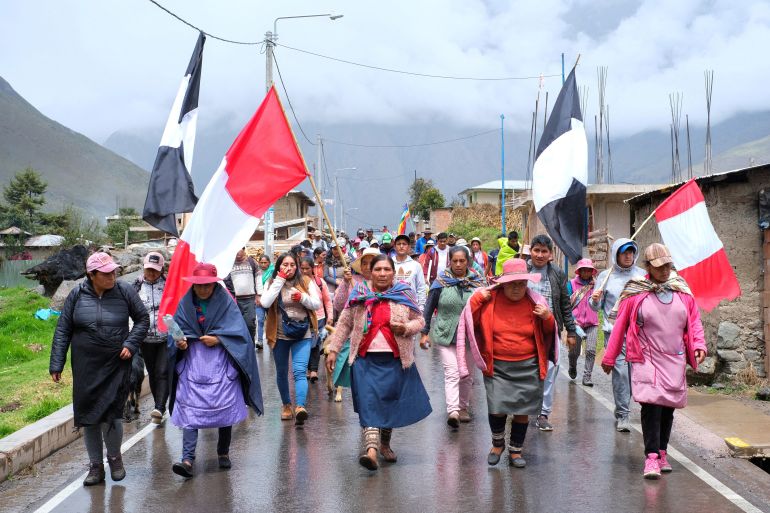‘Pattern of repression’: US Democrats call to suspend Peru aid
Democrats in the US House of Representatives issue a letter denouncing Peru’s deadly crackdown against protesters.

A group of Democrats in the United States House of Representatives has urged the Biden administration to suspend all security assistance to Peru over a “pattern of repression” against antigovernment protests that has resulted in more than 50 civilian deaths.
Their letter, a copy of which was shared with The Associated Press news agency, asked the Biden administration on Monday to halt its security assistance until the government can confirm that the crackdown in Peru has ended and the Peruvian officials responsible for human rights abuses are being held accountable.
Keep reading
list of 3 itemsPeru’s president says elections could be held later this year
Photos: Protester dies in Lima as Peru’s crisis continues
Peru’s foreign minister is in Washington, DC, this week seeking international support for President Dina Boluarte’s increasingly besieged government. Pressure has been mounting on Boluarte, formerly the vice president under ex-President Pedro Castillo, to resign the post she inherited last month when Castillo was impeached and arrested for his ill-fated attempt to close Peru’s Congress.
“Security forces have indiscriminately responded with almost no regard for protestors’ human rights,” according to the letter, which was signed by 20 mostly progressive House Democrats. “Rather than working to deescalate tensions, the Boluarte government has substantially increased tensions — including classifying protesters as ‘terrorists’ and limiting citizens’ right of movement.”
The US provides more than $40m annually to Peru in security assistance, according to the Washington Office on Latin America, a research nonprofit. The vast majority is aimed at helping Peru counter drug trafficking.
While protesters were initially demanding Castillo’s release from jail, the unrest has spread across the country, galvanising the support of many poor, Indigenous Peruvians who have benefitted little from Peru’s mining-driven economic boom.
Protesters demand that both Boluarte and Congress stand down and that new elections be held this year. Legislators rejected that on Friday. But after another protester died and Boluarte urged them to reconsider, Congress narrowly agreed on Monday to debate a proposal to hold elections in October, with 66 votes in favour, 49 opposed and six abstentions.
Meanwhile, as the protests stretch into their second month, beleaguered security forces have become more forceful.
Among the incidents cited in the letter, organised by Representative Susan Wild of Pennsylvania, was the national police raid on student dormitories at San Marcos University in Lima, which included the mass arrest of nearly 200 people. That shocked many Peruvians because campuses have long been off-limits to security forces except when crimes are being committed.
The campus invasion drew sharp condemnation from the Inter-American Commission on Human Rights, which said it collected testimony from civil society groups who alleged law enforcement officers invaded the bedrooms of student leaders, slung racist remarks at Indigenous activists, and forced women to strip naked and do squats.
Officials from the United Nations and European Union have strongly condemned what they consider the disproportionate use of force. The Biden administration has been more measured, calling for impartial investigations into abuses while also expressing support for Boluarte’s efforts to restore calm and seek a political solution.
Amid the unrest, outgoing US Ambassador Lisa Kenna announced an additional $8m in US support for coca eradication efforts in the remote Upper Huallaga valley, part of the Amazon basin in Peru. Kenna has also met with the defence minister and other Cabinet members.
Such actions send an “ambiguous message”, according to the letter, which was also signed by representatives Alexandria Ocasio-Cortez of New York, Pramila Jayapal of Washington state, and Jim McGovern of Massachusetts, a longtime voice for human rights in Latin America.
“The US government can and must do more,” they wrote. “We believe our proposed actions would send a powerful signal in support of fundamental rights and help promote effective engagement for a political resolution.”
A copy of the letter was also sent to Secretary of State Antony Blinken and Secretary of Defense Lloyd Austin.